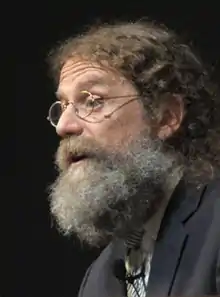Robert Sapolsky
Robert Maurice Sapolsky (* 6. April 1957 in Brooklyn, USA) ist ein amerikanischer Neuroendokrinologe, Professor der Biologie, Neurowissenschaft und Neurochirurgie an der Stanford University, Forscher, Wissenschaftler und Autor.

Leben
Sapolsky erwarb einen Bachelor of Arts an der Harvard University und einen Ph.D. in Neuroendokrinologie an der Rockefeller University. 1987 wurde er Forschungsstipendiat der Alfred P. Sloan Foundation (Sloan Research Fellow). Er arbeitet auf den Gebieten der Neurowissenschaft, der Neurobiologie, der Biologie, der Anthropologie und in der Primatologie.
Er ist zurzeit Hochschullehrer der Biologie, Neurologie und Neurowissenschaft und mit Sondererlaubnis ebenfalls der Neurochirurgie an der Stanford University. Zusätzlich ist er wissenschaftlicher Mitarbeiter an den National Museums of Kenya.[1]
Auszeichnungen
- 2017: Los Angeles Times Book Prize (Kategorie „Science & Technology“) für Behave: The Biology of Humans at Our Best and Worst
Veröffentlichungen (Auswahl)
Bücher
- Stress, the Aging Brain, and the Mechanisms of Neuron Death (MIT Press, 1992) ISBN 0-262-19320-5.
- Why Zebras Don’t Get Ulcers (1994, Holt Paperbacks/Owl 3rd Rep. Ed. 2004) ISBN 0-8050-7369-8.
- deutsch: Warum Zebras keine Migräne kriegen. München 1998.
- The Trouble with Testosterone: And Other Essays on the Biology of the Human Predicament (Scribner, 1997) ISBN 0-684-83891-5.
- Junk Food Monkeys (Headline Publishing, 1997) ISBN 978-0-7472-7676-0.
- A Primate’s Memoir. Touchstone Books, New York 2002, ISBN 0-7432-0247-3.
- Monkeyluv: And Other Essays on Our Lives as Animals (Scribner, 2005) ISBN 0-7432-6015-5.
- Behave: The Biology of Humans at Our Best and Worst (Penguin Press, Mai 2017) ISBN 1-59420-507-8.
- dt. Gewalt und Mitgefühl. Die Biologie des menschlichen Verhaltens. Hanser, München 2017, ISBN 978-3-446-25672-9.
Artikel
- Endocrinology al fresco: Psychoendocrine studies of wild baboons. In: Recent Progress in Hormone Research. Band 48, 1993, S. 437–459.
- als Co-Autor: Hypercortisolism associated with social isolation among wild baboons. In: Archives of General Psychiatry. Band 54, 1997, S. 1137–1143.
- The Physiology and Pathophysiology of Unhappiness. In: D. Kahneman, E. Diener, N. Schwarz (Hrsg.): Well Being: The Foundations of Hedonic Psychology. New York 2000.
Kurse
- Being Human: Life Lessons from the Frontiers of Science, a course by the Teaching Company in 2012.[2]
- Biology and Human Behavior: The Neurological Origins of Individuality, a course by the Teaching Company in 2005.[3]
- Stress and Your Body, a course by the Teaching Company in 2010.[4]
- Human Behavioral Biology, Stanford University undergraduate biology course. 2011 (Youtube)
Weblinks
- An interview with Robert M. Sapolsky (Amos Esty and Greg Ross for American Scientist, September 2005)
- Does age quash our spirit of adventure? (All Things Considered on NPR, 15. August 2006)
- Class day 2009 lecture: The uniqueness of humans (Stanford University, 17. Juni 2009, Youtube)
- Robert Sapolsky on stress: an interview (BoingBoing, 23. November 2011)
- Robert Sapolsky: Ingenious The primatologist and neurologist talks turblence – teens, stress and the information age, Nautilus, 24. Juli 2014
- Robert Sapolsky: Why Your Brain Hates Other People – And how to make it think differently, Nautilus, 22. Juni 2017, Auszug aus dem Buch Behave: The Biology of Humans at Our Best and Worst
Einzelnachweise
- Robert Sapolsky. Abgerufen am 22. Februar 2009.
- Robert Sapolsky: Being Human: Life Lessons from the Frontiers of Science, The Teaching Company. Abgerufen am 20. April 2012.
- Robert Sapolsky: Biology and Human Behavior: The Neurological Origins of Individuality, 2nd edition, The Teaching Company. Abgerufen am 10. November 2010.
- Robert Sapolsky: Stress and Your Body, The Teaching Company. Abgerufen am 29. Mai 2011.